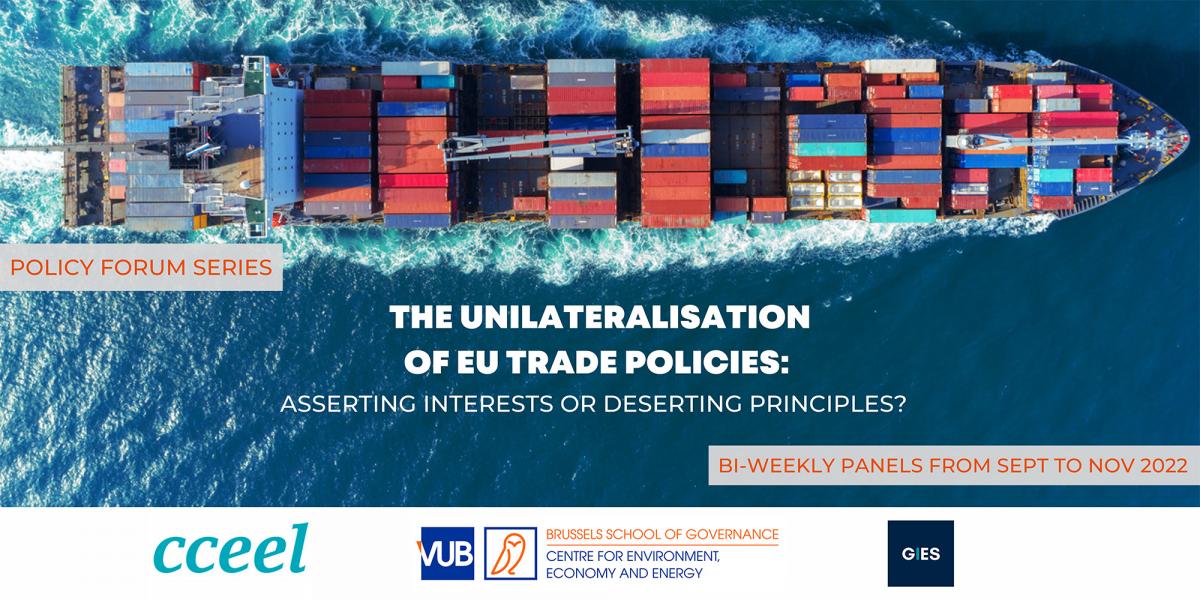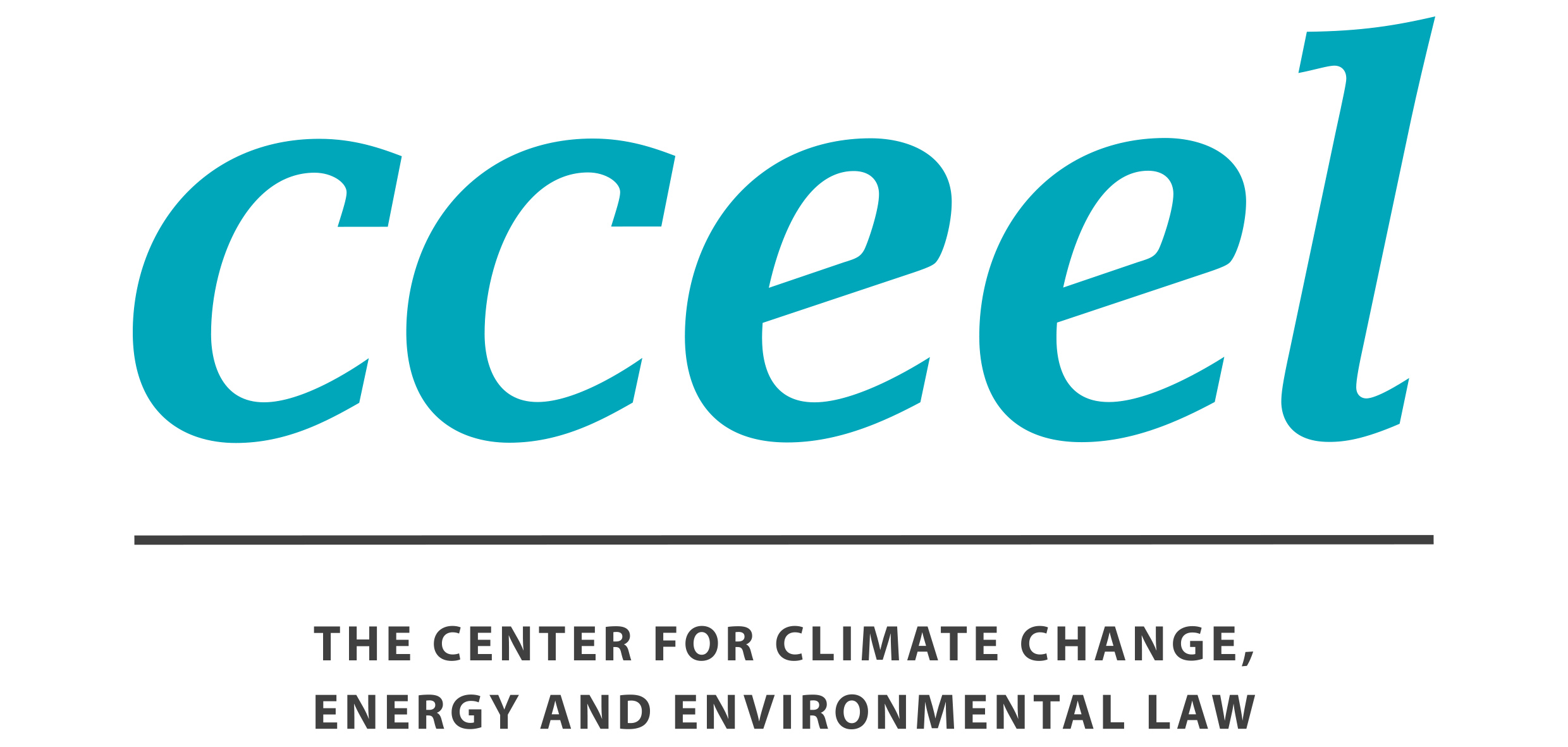Policy Forum Series on unilateralism in EU trade policies

The Policy Forum Series ‘The unilateralisation of EU trade policies – asserting interests or deserting principles?’ took place throughout the autumn. The series was organised by Prof Harri Kalimo (The Center for Climate Change, Energy and Environmental Law (CCEEL), University of Eastern Finland and the Centre for Environment, Economy and Energy (C3E), Brussel School of Governance, Vrije Universiteit Brussel), Researcher Simon Happersberger (Centre for Environment, Economy and Energy (C3E), Brussel School of Governance, Vrije Universiteit Brussel) and Prof Ferdi de Ville (Ghent University). The series was organised with the ERASMUS+ funding for the Jean Monnet Chair ECOvalence (Grant 101085564).
The aim of the series was to explore the multiple new trade policy measures, which the EU has recently initiated, and that are likely to affect many adjacent sectors such as environmental and climate policies. These EU measures are attracting considerable attention both within the Union and amongst its trading partners, and they resonate closely with the Union’s new “more assertive and sustainable European trade policy”, introduced in early 2021. The measures are seen by many as aimed at strengthening the Union’s strategic autonomy and defending European values and interests in a world that is increasingly geopolitical. Concerns over secure supplies have only exacerbated as a consequence of the Russian war in Ukraine. The new trade measures however also have the objective of leveraging the EU’s economic power with its trading partners in sectors beyond trade, such as labour standards and environmental sustainability. Are we thus witnessing a shift away from multilateralism towards more defensive, unilateral policies in the EU? Is such a unilateralist shift blending trade with other policies, such as the environment and climate?
These questions were addressed in the launching event in the Series in September by top experts, namely Claire Cheremetinski (Perm Rep France), Markku Keinänen (Perm Rep Finland), Peter Sandler (DG Trade) and Stephen Kho (partner, Akin Gump LLP). “A very instructive and enjoyable exchange of thoughts”, commented the guest moderator of the session, prof Joost Pauwelyn (Geneva Graduate Institute, visiting scholar at the 3E Centre). The lively discussion was captured in news media by Politico.
The opening panel introduced the general theme of the series, the recent proliferation of trade-related policy initiatives in the EU, as well as the unilateralist approach that the Union may be turning towards. The session also prepared the ground for the ensuing three thematic panels of the series. The following three thematic sessions addressed: competition; sustainability; and geopolitics.
The second session focused on the EU’s strategic objective to ensure European corporations an open and fair operating environment. According to the Foreign Subsidies Regulation (‘FSR’), competition in the EU should take place without market-distorting subsidies by third country governments. The same objective is pursued for the EU’s procurement markets through the International Procurement Instrument (“IPI”), an instrument that also leverages open procurement in other countries. The panel discussed whether the Foreign Subsidies Regulation and the International Procurement Instrument will be effective, yet without leading to a round of retaliations, ruinous to the multilateralist ethos of international trade.
The third session focused on unilateralisation and sustainability. The session was dedicated to three EU trade related legislative proposals, namely, the Carbon Border Adjust Mechanisms (“CBAM”), the Deforestation Initiative (“DI”) and the Corporate Sustainability Due Diligence (“CSDD”). These EU legislative proposals attracted considerable attention both within and outside of EU. They raised debate among different stakeholders and also concerns of youth trade partners for having extraterritorial effects. The debate and concerns stem from the understanding that the proposed measures indicate EU’s trade policy approach in strategic autonomy and leverage EU economic powers in spheres that go beyond trade, particularly affecting the environmental policy and human rights in other jurisdictions. The panel discussed the design of the measures and the potential consequences of these measures for third counties.
The final session discussed three instruments that are introduced to safeguard EU policy decisions from geopolitically motivated actions by third country governments, namely, the updated Enforcement Regulation (“ER”), the Anti-Coercion Instrument (“ACI”) and the Foreign Investment Screening Mechanism (“FISM”). The updated Enforcement Regulation allows the EU to retaliate against alleged unfair trade actions by third countries in case a dispute settlement procedure is blocked; the Anti-Coercion Instrument allows the EU to respond to trade actions by third countries that aim to illegitimately influence EU or member state policy decision; while the Foreign Investment Screening Mechanism strengthens member states’ screening of the potential risks of incoming investment. This panel discussed inter alia to what extent the EU’s new geopolitically-motivated instruments can be considered to be purely defensive and how third countries might respond to them.
